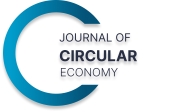Challenges and Paradoxes in Researching in Circular Economy
Abstract
Shaping and researching the circular economy involves multiple paradoxes and challenges hardly manageable by a single researcher or practitioner. This perspective argues for taking a more systemic viewpoint and multiple level perspective in order to better interlock skills. A systemic design of circular economy research requires multi-stakeholder collaboration and new opportunities for intervention.
DOI: https://doi.org/10.55845/OEMK9774
References
Arnold, M. 2021. The challenging role of researchers coping with tensions, dilemmas and paradoxes in transdisciplinary settings. in: SI Transdisciplinary research approaches for sustainable development. Sustainable Development. doi.org/10.1002/sd.2277.
CEI. 2021. Circular Economy Roadmap for Germany.Cheng, Ichin. 2018. Why Asia matters: Circular Economy in Japan, China and Taiwan, in Martin Charter (Ed.). Designing for the Circular Economy. Springer, S. 54-69.
Chauhan, Chetna, Parida, Vinit, Dhir, Amandeep 2022. Linking circular economy and digitalisation technologies: A systematic literature review of past achievements and future promises, Technological Forecasting and Social Change, Vol. 177, 121508, https://doi.org/10.1016/j.techfore.2022.121508.
Corvellec, Hervé, Stowell, Alison F., Johansson, Nils. 2022. Critiques of the circular economy. Journal of Industrial Ecology 26. 421–432. https://doi.org/10.1111/jiec.13187.
van Dorp, K. 2002, Tracking and tracing: a structure for development and contemporary practices, Logistics Information Management, Vol. 15 No. 1, pp. 24-33. https://doi.org/10.1108/09576050210412648.
Friedrich, B. 2020. Sustainable Utilization of Metals: Processing, Recovery and Recycling. MDPI – Multidisciplinary Digital Publishing Institute.
Greer, Rachel, Wirth, Timo von, Loorbach, Derk. 2021. The Waste-Resource Paradox: Practical dilemmas and societal implications in the transition to a circular economy. Journal of Cleaner Production, 303. 126831. https://doi.org/10.1016/j.jclepro.2021.126831.
Hobson, Kersty, Lynch, Nicholas. 2016. Diversifying and de-growing the circular economy: Radical social transformation in a resource-scarce world, Futures, Vol. 82, 15-25, https://doi.org/10.1016/j.futures.2016.05.012.
Moreau, V. et al. 2017. Coming Full Circle. Why Social and Institutional Dimensions Matter for the Circular Economy. Journal of Industrial Ecology. Vol. 21, Nr 3. 497-506. https://doi.org/10.1111/jiec.12598
Roberts, H., Zhang, J., Bariach, B. et al. 2022. Artificial intelligence in support of the circular economy: ethical considerations and a path forward. AI & Soc. https://doi.org/10.1007/s00146-022-01596-8.
Stephan, G. 2022. Circular Economy: Illusion or First Step towards a Sustainable Economy: A Physico-Economic Perspective. Sustainability, 14, 4778. https://doi.org/10.3390/su14084778.
Toker, K., Görener, A. 2023. Evaluation of circular economy business models for SMEs using spherical fuzzy TOPSIS: an application from a developing countries’ perspective. Environ Dev Sustain 25, 1700–1741. https://doi.org/10.1007/s10668-022-02119-7.
Trento, L. R. et al. 2021. Industry-retail symbiosis: What we should know to reduce perishable processed food disposal for a wider circular economy. Journal of Cleaner Production, 318 doi:10.1016/j.jclepro.2021.128622
How to Cite This Article
Arnold, M. (2023). Challenges and Paradoxes in Researching in Circular Economy. Journal of Circular Economy, 1(4). https://doi.org/10.55845/OEMK9774
Copyright
Open Access: This article is licensed under a Creative Commons Attribution 4.0 International License, which permits use, sharing, adaptation, distribution and reproduction in any medium or format, as long as you give appropriate credit to the original author(s) and the source, provide a link to the Creative Commons licence, and indicate if changes were made. The images or other third-party material in this article are included in the article’s Creative Commons licence, unless indicated otherwise in a credit line to the material. If material is not included in the article’s Creative Commons licence and your intended use is not permitted by statutory regulation or exceeds the permitted use, you will need to obtain permission directly from the copyright holder. To view a copy of this licence, visit http://creativecommons.org/licenses/by/4.0/.
License
Under a Creative Commons license
Author Notes
- Marlen G. Arnold [1]
- [1] Technische Universität Chemnitz, Faculty of Economics and Business Administration, Corporate Environmental Management and Sustainability, 09126 Chemnitz, Germany, [email protected]
Published Details: Received 28 November 2022, Accepted 15 December 2022, available online 24 March 2023
